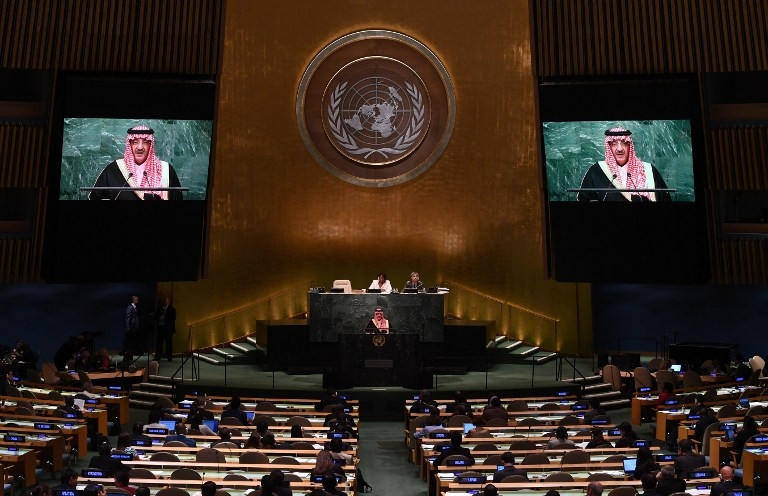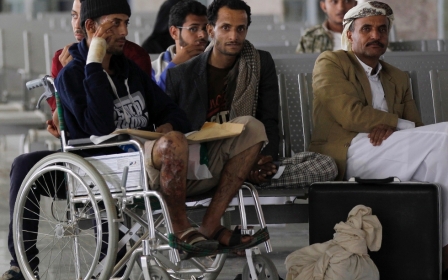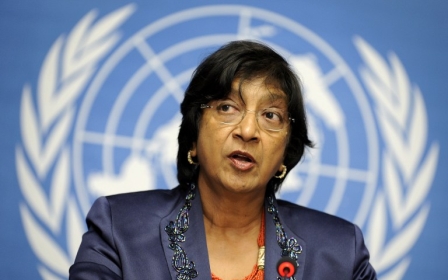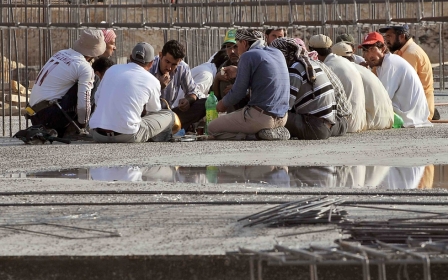Saudi uses role on UN Human Rights Council to cover up its abuses

This week, Saudi Arabia will be re-elected to the UN Human Right Council (HRC) for the fourth time, after another non-competitive election at the UN General Assembly (UNGA).
While serving its third term on the council, Saudi Arabia blocked international inquiries into its human rights abuses, punished Saudi citizens who worked in collaboration with the HRC, and threatened to cut critical UN funding after being called out for violating children’s rights.
Saudi Arabia’s presence on the council turns the HRC’s mission on its head
Given the kingdom’s unrelenting record of repression, Saudi Arabia's continued council membership is an affront to the HRC's mission of promoting and protecting "all human rights around the globe".
It is no secret that Saudi Arabia’s values are at odds with the council's. Religious intolerance, gender inequality and a penchant for public executions are hardly the qualities that the UN had in mind for its council members.
The opposite effect
Worse, instead of incentivising the kingdom to institute reforms to curtail abuses and foster greater accountability, Saudi Arabia’s membership on the council appears to be having the opposite effect.
The number of executions in the kingdom has spiked dramatically since Saudi Arabia was last elected to the council - with 2015 marking the most brutal year in two decades with 157 executions and 2016 closing in with 124 executions as of the end of September.
Meanwhile, the country ignores visit requests from the HRC’s “special procedures” - independent human rights experts who undertake country visits and report back to the council. Currently, Saudi Arabia has seven outstanding visit requests, including requests from special rapporteurs appointed to conduct fact-finding inquiries related to torture, freedom of expression and opinion, and executions.
In addition to resisting human rights investigations by UN experts, Saudi Arabia has sought to prevent its citizens from communicating with the council and other international organisations.
In 2014, the government issued a travel ban against activist Samar Badawi after she spoke at the 27th session of the council on behalf of imprisoned Saudi activist, Waleed Abu al-Khair. Authorities prevented Badawi from travelling to Brussels to attend an EU forum on human rights.
Several Saudi human rights defenders who cooperated with the Human Rights Council have been criminally prosecuted
Under the country’s counter-terrorism law, contacting international organisations, such as the HRC, can be deemed a terrorist offence. Several Saudi human rights defenders who cooperated with the HRC have been criminally prosecuted as a result, including members of the now-shuttered Saudi Association for Civil and Political Rights (ACPRA).
ACPRA co-founder Mohammed al-Qahtani contributed numerous submissions to the HRC’s special procedures, especially to its working group on arbitrary detention. Saudi officials charged him with “provoking international organisations to adopt stances against the kingdom”. Al-Qahtani and ACPRA’s other co-founders are currently serving lengthy prison sentences for their human rights work.
Covering its tracks
While Saudi Arabia’s attempts to prevent both UN official and its own citizens from addressing human rights abuses in the kingdom should disqualify the country from a seat at the council table, its actions in Yemen over the past 19 months are an even greater affront to the HRC’s mission.
By now the word is out that Saudi-coalition airs trikes are responsible for the majority of the roughly 4,000 civilian deaths in Yemen. Hospitals, schools, marketplaces, weddings, and factories have and remain viable coalition air strike targets.
On 9 October, the coalition carried out possibly the single deadliest attack in the conflict, an air strike on a funeral ceremony in Sanaa, which killed over 140 and injured over 500.
As reprehensible as these incidents are, Saudi Arabia’s efforts to prevent the world from learning how and why these atrocities occurred make the situation far worse.
Saudi Arabia is using its position on the council to block international efforts to investigate the role of all combatants in Yemen’s devastation
Instead of working with the UN mechanisms to reform its military campaign and alleviate the resulting humanitarian crisis, Saudi Arabia is using its position on the council to cover its tracks and avoid responsibility. It has fought tooth and nail against international efforts to investigate the role of all combatants in Yemen’s devastation.
Last month, at the 33rd session of the HRC, Saudi Arabia led a successful effort for the second year in a row to block an EU resolution for an international inquiry. In its place, council members passed an Arab-state sponsored resolution providing additional support for an ongoing probe by the Yemeni National Commission of Inquiry.
The Yemeni National Commission, established last year by the UN Office of the High Commissioner for Human Rights (OHCHR) after an international inquiry resolution failed, has been widely criticised as biased and ineffectual.
According to UN Deputy High Commissioner for Human Rights Kate Gilmore, the Yemeni inquiry "lacks impartiality, does not abide by the basic norms of protection" and its mandate, composition and methodology fail to meet international standards.
Demanding greater accountability
The defeat of an international inquiry is just the most recent example of the ways in which Saudi Arabia has thwarted the council’s efforts to address the crisis in Yemen.
In June, Saudi Arabia successfully blackmailed the UN into removing the Saudi coalition from a list of violators of children’s rights by threatening to cut UN funding.
UN officials working under Saudi oversight banned foreign journalists and human rights workers from their flights into and out of Yemen
Even as early as two months into the conflict, UN officials working under Saudi oversight banned foreign journalists and human rights workers from their flights into and out of the increasingly isolated country. UN officials and aid workers, speaking on condition of anonymity, said the ban was instituted after Saudi officials rejected a flight manifest that included reporters from the New York Times, BBC and other journalists.
The HRC was established to promote human rights and hold violators accountable. Saudi Arabia’s presence on the council turns the HRC’s mission on its head.
It is time for member states to push back against Saudi threats and obstructions and demand greater accountability and transparency from their fellow council member. Otherwise, they risk becoming increasingly complicit in the very violations that the HRC was created to eradicate.
- Leah Schulz is an Advocacy Fellow at Americans for Democracy & Human Rights in Bahrain (ADHRB).
The views expressed in this article belong to the author and do not necessarily reflect the editorial policy of Middle East Eye.
Photo: Saudi Arabia’s Crown Prince Mohammed bin Naif bin Abdulaziz Al-Saud addresses the 71st session of the United Nations General Assembly at the UN headquarters in New York on 21 September 2016 (AFP)
This article is available in French on Middle East Eye French edition.
New MEE newsletter: Jerusalem Dispatch
Sign up to get the latest insights and analysis on Israel-Palestine, alongside Turkey Unpacked and other MEE newsletters
Middle East Eye delivers independent and unrivalled coverage and analysis of the Middle East, North Africa and beyond. To learn more about republishing this content and the associated fees, please fill out this form. More about MEE can be found here.





